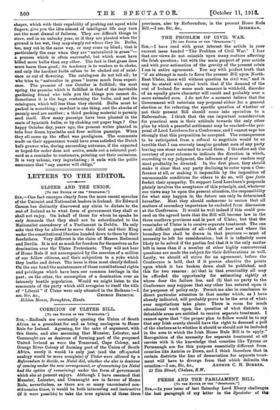THE PROBLEM OF CIVIL WAR.
[To THE EDITOR OF THE "SPECTATOR."]
Stn,—I have read with great interest the article in your current issue headed " The Problem of Civil War." I fear that our views do not coincide upon many matters affecting the Irish question ; but with the main purport of your article and with your estimation of the gravity of the present crisis I am in entire agreement. You say with perfect truth that "if an attempt is made to force the present Bill upon North- East Ulster, there will without question be civil war," and it may be stated with equal truth that if the demand of the rest of Ireland for some such measure is withheld, disorder of an equally grave character will result and probably over a more extended area. I do not for a moment believe that the Government will entertain any proposal either for a general election or for referring the specific question of whether or not their present Bill should come into operation to a Referendum. I think that the one important consideration for practical men is their attitude towards the only other plan by which a peaceful settlement may he reached—the pro- posal of Lord Loreburn for a Conference, and I cannot urge too strongly that this proposition be accepted. The consequences to be anticipated from a refusal to negotiate would be so terrible that I can scarcely imagine prudent men of any party leaving one stone unturned to avoid them. I therefore ask the courtesy of your columns to indicate the direction in which, according to my judgment, the influence of your readers may most profitably be directed. In the first place, they should make it clear that any party declining to enter upon a Con- ference at all, or making it impossible by the imposition of unreasonable conditions for others to do so, will ipso facto forfeit their sympathy. To support Lord Loreburn's proposals plainly involves the acceptance of this principle, and, whatever our views may be upon the present situation, the responsibility for what may happen in the future can only be determined hereafter. Next they should endeavour to secure that all matters of secondary importance be excluded from discussion at the Conference. It would be well indeed if this could pro- ceed on the agreed basis that the Bill will become law in the three southern provinces and in part of Ulster, but that the remainder of Ulster is to receive separate treatment. The one most difficult question of all—that of how and where the boundary line shall be drawn in that province must of necessity be left for consideration; but it is infinitely more likely to be solved if the parties feel that it is the only matter left in issue than if a number of other highly controversial questions are made the subject for their deliberations as well. Lastly, we should all strive for an agreement, before the Conference is held, that if it proves abortive the points upon which it has broken down shall be published, and this for two reasons : (a) that in that eventuality all may be afforded the opportunity for estimating rightly at whose door the failure lies, and (b) that no party to the Conference may suppose that any other has entered upon it for purposes of policy only. Permit me also in conclusion to direct particular attention to that matter which, as I have already indicated, will probably prove to be the crux of what- ever negotiations take place. There is room for much educational work upon the question of what districts in debatable areas are entitled to receive separate treatment. I cannot agree that " the proper plan to follow would be to say that any Irish county should have the right to demand a poll of the electors as to whether it should or should not be included in the area to which the Irish Home Rule Bill is to apply." Recognition of the necessity for separate treatment at all carries with it the knowledge that counties like Tyrone or Fermanagh are for this purpose essentially different from- counties like Antrim or Down, and I think therefore that in certain districts the line of demarcation for separate treat- ment will have to diverge from that which delimits the counties.—I am, Sir, &c., ARTHUR C. H. BOBBER, 21 Tile Street, Chelsea, S.W.














































 Previous page
Previous page